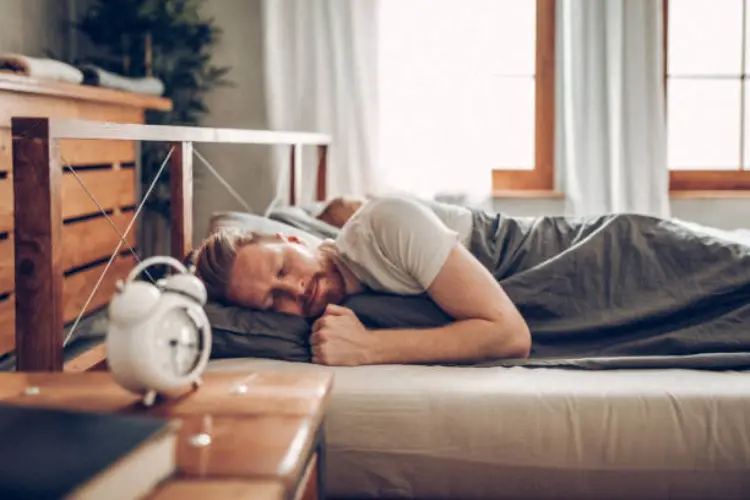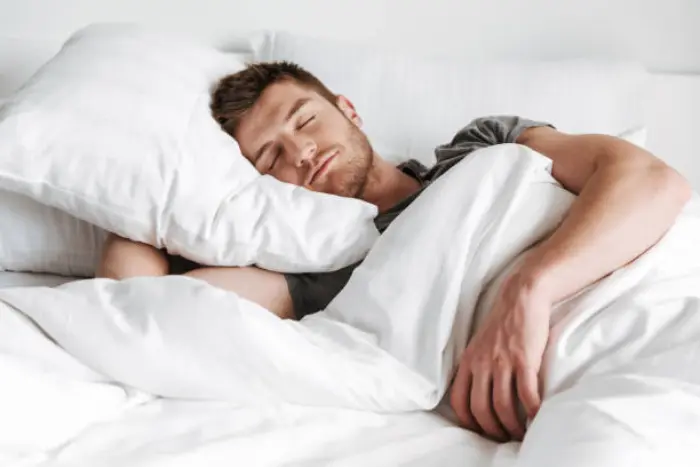Have you ever experienced the sudden shock of being awakened in the middle of your sleep, only to find yourself with no pillows and sliding off your bed? It’s a common occurrence that often leads us to scratch our heads, but understanding why it happens can help end these midnight misadventures.
Several factors contribute to this problem, including the kind of mattress and sheets, body weight and even sleeping position. These elements all play an important role in determining how restful our nights are. But the good news is that there are solutions to each of these issues.
Read on to discover why this could be happening and how to prevent it from occurring.
Why Do I Slide Down the Bed When I Sleep: Five Reasons
Sleep is essential for a healthy, happy life, but if you find yourself sliding down your bed during the night, it can be incredibly disruptive. It may seem like an irritating inconvenience at first glance, yet there are actually many potential causes behind this issue.
ONE: Bedding Material
The type of material used in your bedding can significantly impact your body-sheet friction. Slippery materials like silk and satin increase sliding, making maintaining a stable position throughout the night challenging.
On the other hand, materials with a higher level of roughness, such as cotton or flannel, provide more traction, reducing the likelihood of slipping.
TWO: Poor Mattress Quality
An old or low-quality mattress frequently loses shape over time, causing an indentation in the middle. This sagging can make it hard to maintain a comfortable sleeping position, leading to a higher likelihood of sliding down the bed.
Investing in a new, high-quality mattress is the best solution to avoid this issue.
THREE: Body Weight & Heat
During sleep, our body temperature increases, and sweating can occur, making our skin and sheets slippery. This increased tendency to slide can be exacerbated by heavier body weight, requiring more friction to stay in place.
Aside from this, larger individuals may have difficulty staying in one spot throughout the night, increasing the likelihood of sliding.
FOUR: Sleeping Position
Your sleeping position affects the direction of sliding down the bed. Those who sleep on their back or stomach experience more sliding due to gravity, which pulls their body towards the foot of the bed.
Sleeping on your side is the best way to avoid sliding, as it reduces your body’s overall surface area on the mattress.
FIVE: Bedding Fit
Properly fitting bedding is crucial for maintaining a consistent position while sleeping. A fitted sheet that is too big can bunch up, causing pockets of air that trap heat and lead to sliding. In contrast, too small sheets may pop off the corners, creating gaps where sliding can occur.
Ensure that your bedding fits snugly and securely to prevent slipping throughout the night.
What Is the Effect When a Person Slides Down In Bed?
Slumbering peacefully in bed can be quickly interrupted by the sensation of slipping down its surface. While a bit irritating, this seemingly simple act can have much bigger implications than initially assumed, including:
- Uncomfortable Pressure Points: Sliding down in bed puts pressure on specific points in our body, such as our buttocks, hips, and lower back, causing discomfort, pain, and even skin breakdown. This risk is further increased for individuals with limited mobility and medical conditions that affect circulation.
- Reduced Respiratory Function: Sliding down in bed may change our head and neck positions. This can lead to reduced airway patency, resulting in shallow breathing, snoring, or even sleep apnoea, which can be harmful in the long term.
- Compromised Digestive Function: When we lie flat, the stomach and intestines should be at a slight angle, facilitating digestion and preventing reflux. Sliding down in bed can compromise this angle, leading to digestive issues such as reflux.
- Increased Risk of Falls and Injury: Sliding down in bed increases the risk of falls, particularly for older adults and individuals with limited mobility. Falls from bed can result in fractures, head injuries, and other complications, making it a serious concern for our safety and wellbeing.
- Disrupted Sleep: When we slide down in bed, we may unintentionally change our sleeping position or disrupt the alignment of our body, leading to discomfort and poor sleep quality. This can affect our daily productivity and overall health.
What Can You Do To Stop Your Bed From Sliding Down?
Consider taking precautions to protect yourself from the discomfort and danger of sliding down your bed at night. With just a few simple steps, you can keep this problem at bay and enjoy restful nights of slumber without worry.
#ONE: Adjusting the Bed Position
One of the primary reasons why beds slide down is because they are not positioned correctly. For your bed not to slide, you need to ensure that the head of the bed is elevated to prevent reflux. Additionally, securing the foot of the bed prevents sliding.
When you adjust your bed’s position, you minimize the chances of sliding and maximize comfort.
#TWO: Using Supportive Pillows and Cushions
Supportive pillows and cushions offer an excellent solution to bed sliding. The pillows and cushions provide extra support and padding to pressure points, and placing them under the lower back, hips, and buttocks alleviates pressure and prevents sliding.
#THREE: Using a Mattress with Non-Slip Surface
To prevent your mattress from sliding, you need to invest in one that has a non-slip surface. Medical-grade mattresses may have non-slip surfaces, and you can also use mattress pads for the same purpose.
A non-slip surface ensures that there is friction between the mattress and sheets, which minimizes the chances of sliding.
#FOUR: Adjust Your Sleeping Position
Your sleeping position can also affect bed sliding. Sleeping on your back makes you more likely to slide down the bed. To prevent this, sleep on your side or stomach, which distributes your weight evenly and prevents sliding down the bed.
#FIVE: Use Auto-Contour or Knee Gatch
If you are using a hospital bed, you can use the auto-contour or knee gatch features to stop the bed from sliding. These features help reduce migration by up to 2.5 cm when articulating the bed.
You can also reduce the likelihood of the bed sliding by raising the knee gatch first.
Slide No More: Unravelling the Mystery of Bed Sliding
Sliding down the bed while sleeping can be frustrating and uncomfortable, and it turns out it’s a common experience for many people. Fortunately, there are multiple reasons why this phenomenon occurs, meaning there are many ways to solve the issue.
Whether it’s your bedding material, the quality of your mattress, your body weight and heat, your sleeping position, or the fit of your bedding, there are solutions available. If you’re tired of sliding down the bed every night, consider investing in new bedding or trying different sleeping positions.
So, don’t suffer in silence. Experiment with different solutions so you can get the restorative sleep you deserve.





